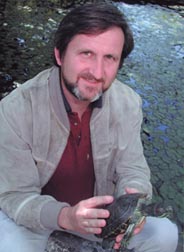题 目:Visualizing a forest of phylogenetic trees
报告人:David M. Hillis(美国科学院院士),University of Texas at Austin
时 间:2010年6月28日(星期一)上午10:00
地 点:动物研究所B105
欢迎参加!
动物生态与保护生物学院重点实验室
动物进化与系统学院重点实验室
Abstract: Researchers often must consider hundreds or thousands of phylogenetic trees that are consistent with a given set of data. Multiple trees may result from analysis of multiple genes, from Bayesian sampling of trees, or from consideration of statistically indistinguishable trees. Faced with a forest of results, phylogeneticists have often simply examined consensus signal among the different trees. This approach can be problematic, especially if different processes or gene histories underlie the different trees obtained. I will discuss an approach (Tree Set Visualization) for visualizing, exploring, and reporting on phylogenetic analyses that result in large numbers of solutions. This method uses multidimensional scaling of tree-to-tree distances to visualize relationships among many tree solutions and then clusters the results in two-dimensional space. Groups of trees ("tree islands") can be identified and analyzed; these tree islands often represent different fundamental solutions or histories. Consensus analyses can be restricted to subsets of trees that are statistically combinable. Tree Set Visualization is also useful for visualizing progress in Markov-Chain-Monte-Carlo searches and as an educational and presentation tool for explaining analyses and presenting phylogenetic results. As an example of the method, I will explore the differences obtained from multiple studies and multiple genes that have been collected to address the question of amphibian phylogeny.
 David Hillis 教授目前是世界上分子进化生物学研究领域享誉盛名的科学家。多次获得各种奖励,并于2008年荣誉当选为美国科学院院士,目前被多所大学和研究机构邀请成为客座教授。Hillis教授在分子进化生物学研究领域出版发表了大量经典的论文和著作,推动了生物物种进化研究和系统发育数据分析领域的极大发展。截止2009年在Science, Nature, Nature Genetics, Systematic Biology, PNAS等国际著名学术刊物上发表论文400多篇。根据ISI 信息检索平台显示,他的论文引用统计超过上万次,平均每年引用次数700次以上。Hillis教授与Craig Moritz教授二人于1990年编撰的《分子系统学》(Molecular Systematics)一书成为分子系统进化研究领域的经典著作。1996年又第二次再版印刷,重印长达10年之久,目前仍然广受大家的赞誉,在世界上很多国家被广泛阅读。2010年David Hillis 教授荣誉当选中科院“爱因斯坦讲席教授”计划项目。
David Hillis 教授目前是世界上分子进化生物学研究领域享誉盛名的科学家。多次获得各种奖励,并于2008年荣誉当选为美国科学院院士,目前被多所大学和研究机构邀请成为客座教授。Hillis教授在分子进化生物学研究领域出版发表了大量经典的论文和著作,推动了生物物种进化研究和系统发育数据分析领域的极大发展。截止2009年在Science, Nature, Nature Genetics, Systematic Biology, PNAS等国际著名学术刊物上发表论文400多篇。根据ISI 信息检索平台显示,他的论文引用统计超过上万次,平均每年引用次数700次以上。Hillis教授与Craig Moritz教授二人于1990年编撰的《分子系统学》(Molecular Systematics)一书成为分子系统进化研究领域的经典著作。1996年又第二次再版印刷,重印长达10年之久,目前仍然广受大家的赞誉,在世界上很多国家被广泛阅读。2010年David Hillis 教授荣誉当选中科院“爱因斯坦讲席教授”计划项目。



